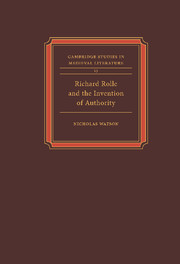Book contents
- Frontmatter
- Contents
- Preface
- List of abbreviations
- Introduction: Contexts: three preliminary essays
- PART I
- PART II
- PART III
- PART IV
- 8 ‘Mixed’ life: Super Lectiones Mortuorum and Emendatio Vitae
- 9 ‘Mixed’ life: the English works
- Epilogue: Rolle as a late medieval Auctor
- Excursus I: The chronology of Rolle's writings
- Excursus II: Rolle's reading and the reliability of the Officium
- Notes
- Bibliography
- Index
9 - ‘Mixed’ life: the English works
Published online by Cambridge University Press: 04 December 2009
- Frontmatter
- Contents
- Preface
- List of abbreviations
- Introduction: Contexts: three preliminary essays
- PART I
- PART II
- PART III
- PART IV
- 8 ‘Mixed’ life: Super Lectiones Mortuorum and Emendatio Vitae
- 9 ‘Mixed’ life: the English works
- Epilogue: Rolle as a late medieval Auctor
- Excursus I: The chronology of Rolle's writings
- Excursus II: Rolle's reading and the reliability of the Officium
- Notes
- Bibliography
- Index
Summary
It is not certain at what point in his complex and carefully organized career as a writer of Latin commentaries and libri Rolle first turned to the medium of English. Apart from one short personal piece (Ghostly Gladness), all his English works – epistles, Passion meditations, commentaries, prose pieces and lyrics – are best seen as varieties of pastoral writing, belonging most naturally to what I have called the ‘mixed’ life phase of his career: that is, to the last few years of his life. However, while it is clear that The Commandment and The Form of Living were products of this period, and most likely that the English Psalter was, too, it may be that a few of the English works were composed earlier, while he was engaged on the series of apologetic writings which began with Incendium Amoris and reached its climax with Melos Amoris. Though this can doubtless neither be proved nor disproved, it is worth stressing at the outset for two reasons. First, modern interest in Rolle's ‘supreme place in the history of English prose’ (Chambers 1932, p. ci) – which largely rests on the fact that during the century and a half after his death his works ‘attracted a larger audience than [those of] any previous writer in the language’ (Alford 1984, p. 38) – has often led to the assumption that in turning to English he must have felt he had found his true meétier, and so have in effect rejected Latin; Allen, for example, can state blandly: ‘It is likely that when once Rolle began to write English, he wrote little more Latin’ (p. 186).
- Type
- Chapter
- Information
- Richard Rolle and the Invention of Authority , pp. 222 - 256Publisher: Cambridge University PressPrint publication year: 1991



